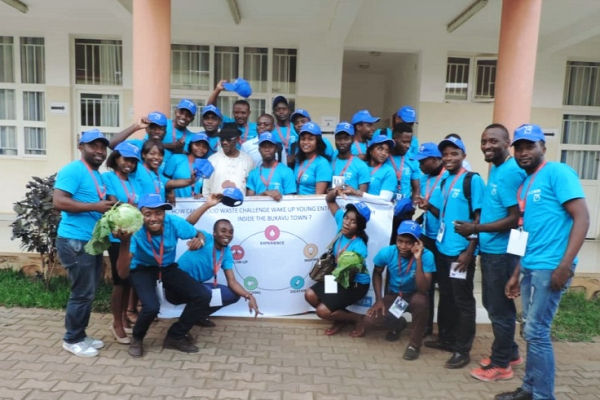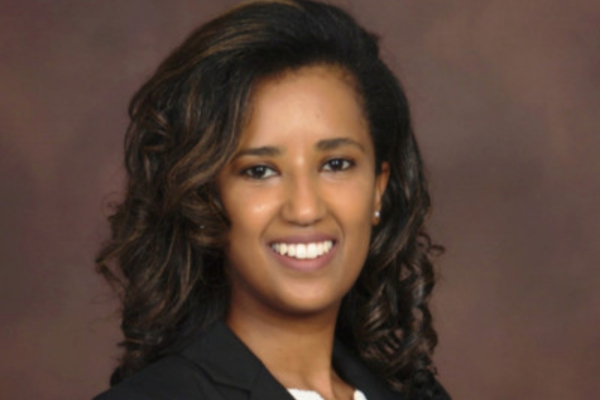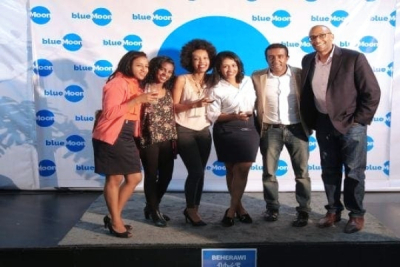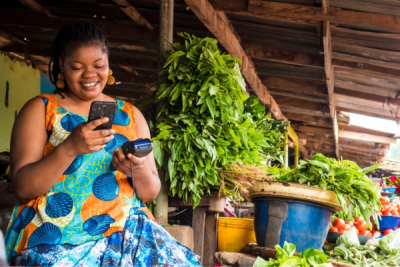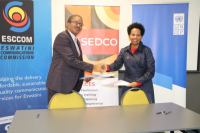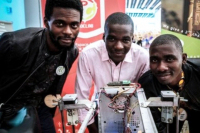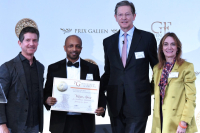KivuHub describes itself as a hub for tech entrepreneurs. It provides virtual spaces for ambitious startups and entrepreneurs aiming to make a global impact through technology, thereby uplifting the eastern DR Congo region.
Established in 2017 by Eliud Aganze and a team of co-founders comprising Patrick Nahayo, Julien Ntibonera, and Marius Mathondo, KivuHub is a tech accelerator and virtual coworking space based in the Democratic Republic of Congo. With a core focus on fostering the growth of startups, and small and medium-sized enterprises, as well as innovative tech projects, its mission is to provide support and promote these ventures.
The center offers mentoring and training, investor connection, web project management, graphic design, web/mobile/software development, and cybersecurity services. It also has a hybrid cloud platform that enables entrepreneurs to host their web and mobile applications.
In addition to its core activities, KivuHub has launched specific programs to support women, girls, and young entrepreneurs. The program aims to help beneficiaries innovate in technology by improving their digital skills, solving community problems, protecting the environment, and strengthening business networking and IT skills.
Through its platform Girls in Tech, the center aims to contribute to gender equality, improve the quality of education, and promote women’s digital inclusion in eastern DR Congo between 2022 and 2025.
KivuHub works with various investor networks and other hubs in the region to address the complex challenges facing the world. It is an active member of AfriLabs and other startup groups.
Melchior Koba
She uses tech tools to help businesses reach their full potential. Through her startup Telliscope, she offers an AI-powered business intelligence platform to companies.
Mellena Haile (photo) is the founder and managing director of Telliscope, a technology company that provides data and analysis on fast-growing emerging economies.
Born in Ethiopia, Mellena Haile moved to the United States with her family before completing her higher education. She obtained a Bachelor's degree in Architecture at the University of Virginia and continued her studies at the Darden Graduate School of Business, where she earned a Master of Business Administration.
In 2016, she founded E-Pulse, which later became Telliscope. It is a digital platform that uses artificial intelligence to collect, analyze, and visualize data on markets, consumers, and competitors in emerging countries. It enables entrepreneurs to market their businesses, access resources, and securely connect with investors. With offices in Washington D.C., Los Angeles, and Addis Ababa, it has a diverse team of technologists, economists, and designers.
On October 5, 2023, Telliscope was selected to join the Google for Startups Accelerator: AI First program. Along with the other 10 beneficiaries of the program, it will be mentored for 10 weeks to scale its AI solution globally and for Africa. The company will also receive up to $350,000 in Google Cloud credits and access to Google's AI expertise and support.
Mellena Haile's professional career began in 2007 at Project Capital +, a project development company, where she was a summer associate in charge of emerging markets in Africa. In 2010, she joined the Kauffman Foundation, one of the world's leading organizations on entrepreneurship and education, as a lead researcher on Africa.
She has received numerous national and international awards for her entrepreneurial and innovative works. In 2016, she was on the African Next Generation Leaders list. Then, three years later, she was invited to the Africa Fintech Summit. In 2023, she also joined NVIDIA Inception, a program that supports high-growth early-stage companies revolutionizing industries with cutting-edge capabilities and technological advances.
Melchior Koba
Africa has abundant natural resources, yet grapples with many challenges, including food security, climate change, poverty, and youth unemployment. In response to these pressing issues, blueMoon Incubator fosters innovation and entrepreneurship within the agricultural sector, aiming to address these challenges through sustainable and impactful solutions.
blueMoon Incubator is Ethiopia's first agribusiness startup incubator. Founded in 2016 by Eleni Gabre-Madhin, a serial entrepreneur responsible for innovation at UNDP Africa, blueMoon Incubator's mission is to discover, incubate, and invest in exceptional ideas and founding teams in the agricultural sector.
The incubator presents an intensive four-month program, conducted biannually in Addis Ababa, engaging 10 teams comprising 2-3 entrepreneurs carefully chosen from a pool of hundreds of applicants. Successful startups enrolled in the program receive tailored guidance, training, and entry to an extensive network of investors, service providers, and strategic partners. Additionally, they receive an initial funding of 200,000 Ethiopian birr (approximately $3,500) in exchange for 10% equity. Moreover, the participants gain access to 12 months of coaching from external volunteer mentors, who are seasoned business professionals, providing both individual and team support.
Upon completion of the incubation program, startups are presented with various funding options facilitated by blueMoon Ventures for their subsequent investment rounds. Additionally, the incubator provides versatile coworking spaces, and offices, as well as informal and formal meeting spaces, accessible around the clock and furnished with high-speed WiFi connectivity.
As a member of the AfriLabs network, blueMoon has signed partnerships with several companies and institutions. The incubator's partner institutions include Iceaddis, Digital Opportunity Trust, The xHub, The MasterCard Foundation, and Aspen Network of Development Entrepreneurs.
Melchior Koba
Global finance has gone digital to prioritize convenience, efficiency, and speed. This choice has yielded positive effects across various sectors, particularly in commerce. In Africa, financial experts have also embraced this transformation but numerous challenges persist.
The fifth edition of the Next Fintech Forum will be held in Abidjan, Côte d’Ivoire, on November 16-17, under the theme "Fintech and commerce: shaping African trade." Organized at the Radisson Blu by the Africa Fintech Forum, the two-day event will bring together several experts, entrepreneurs, and enthusiasts from e-finance, commerce, finance, logistics, and many other related sectors.
They will discuss the impact of fintech on African commerce, and share their knowledge, ideas, and experiences in using financial technologies to stimulate business growth, enhance the customer experience, and strengthen the competitiveness of African trade on a global scale.
Speaking about the objectives of the Next Fintech Forum, Alex Sea, President and CEO of the Africa Fintech Forum, states: "In recent years, there has been a surge in the development of new business models, groundbreaking technologies, and customer-centric experiences that are revitalizing the global financial landscape. Fintech, which is the application of technology to deliver innovative financial solutions, is experiencing unprecedented growth. [It is] an attractive and dynamic sector that needs to be developed and structured, particularly in French-speaking Africa. Mindful of the disparity between a thriving, rapidly expanding industry and local infrastructures that may not be adequately equipped to harness the full potential of Fintech, our aim is to effect positive change.”
Over the past five years, the fintech sector has attracted the most interest from venture capitalists and angel investors in Africa. Of the $6.5 billion raised by African startups in 2022 –up 8% compared to 2021 according to Partech Africa– the fintech sector alone raised $1.9 billion (29.23% of all funds). However, fintechs have not gained credibility or evolved their services sufficiently to meet the new needs of African markets.
In his report "Limits to the expansion of African fintechs", Idriss Linge, business journalist and editor-in-chief of Agence Ecofin, explains that fintechs need to overcome a number of challenges if they are to prosper further on the continent: they need to go beyond money transfer, payment or even small-scale credit.
With the African Continental Free Trade Area (AfCFTA) becoming effective in January 2021, numerous commercial and financial opportunities are emerging on the continent. Opportunities to which fintechs could respond effectively through innovative solutions that will stimulate business growth and boost the competitiveness of African trade on a global scale.
During the last two decades, approximately forty African satellites have been successfully launched into orbit, significantly enhancing telecommunications capabilities and territorial surveillance across the continent. With several more satellites currently in the developmental phase, scheduled launches are anticipated within the upcoming months.
On Wednesday 1ᵉʳ November, the Mauritius Research and Innovation Council (MRIC) and the Indian Space Research Organisation (ISRO) signed a memorandum of understanding to develop, launch, and operate an Earth observation satellite for Mauritius.
The partnership, which runs over 15 months, also takes into account the training of MRIC engineers at ISRO's facilities in India for the design and development of the satellite platform, as well as its associated systems and primary payload.
The new MoU follows a recent visit to Bengaluru by Mauritius' Minister of Information Technology, Communication and Innovation (MITCI), Darsanand Balgobin (photo, right), and MRIC Board Chairman Dr Kaviraj Sharma Sukon. The delegation met with ISRO officials and discussed the technical details and application possibilities for putting a joint satellite into orbit.
The future joint microsatellite will be designed for remote sensing from Low Earth Orbit (LEO). It will enhance Mauritius's earth observation capabilities and the help prevent and combat bushfires, floods, and erosion, and develop agriculture, among other things. On completion, all corresponding in-orbit operations will be carried out jointly by ISRO and MRIC, using MRIC's ground station.
India was not randomly chosen as the technical partner of that project. Several years ago, it signed technological cooperation agreements with four African countries, including Mauritius. The country is committed to providing substantial support for the scientific and technological development of these countries.
Samira Njoya
E-health solutions are rapidly gaining momentum across the continent, providing accessible healthcare options. In response, tech entrepreneurs are continually innovating with practical solutions that aim to enhance the daily lives of their fellow citizens.
Assista Soins is an e-health solution developed by an Algerian startup, established in 2022. It enables access to healthcare services and professionals.
The solution features a mobile application accessible only on Android. After downloading, users can create their Assista Soins account with their details to access the services available. These include medical consultations, nursing care, blood sampling, medical transport, etc. through a network of over 185 partners.
Once a user chooses the service he/she needs, the mobile app will suggest qualified professionals depending on the user’s geographic location. Then, the user has to select the desired professional and confirm the appointment.
Users have the option to subscribe to Assita Soins' services on behalf of a third party, such as a family member or friend. As of August 2023, the e-health platform has facilitated over 300 interventions across all the communes of the Wilaya of Constantine. Recognized for its outstanding contribution, Assita Soins has been selected to represent Algeria at the World Entrepreneurship Summit scheduled for April 2024 in Chile. Its mobile application has already garnered over 500 downloads, as per data from the Play Store.
Adoni Conrad Quenum
The serial entrepreneur co-founded Mstudio to support and finance entrepreneurs in French-speaking Africa. With a particular emphasis on empowering women and the youth, she aims to foster the growth of Africa's next generation of unicorns.
Leslie Ossete (photo) is a serial technology entrepreneur of Congolese and Madagascan descent. Raised in Congo, she moved to the United States to pursue her studies. In 2012, she graduated from UWC-USA (United World College) with an International Baccalaureate. In 2016, she got a Bachelor’s in Economics, Business, and Nonprofit Management from Earlham College.
Driven by the ambition to transform the informal sector in French-speaking African countries, she co-founded Mstudio, the first “mobile” startup studio in French-speaking West Africa, in September 2022.
The studio, where she serves as the Chief Operating Officer, creates and finances startups that meet current needs in the informal sector. It also provides expert support, drawing inspiration from business models that work in English-speaking African countries. Based in Côte d'Ivoire, it focuses particularly on women and young people, who are the main users of mobile technology in Africa.
"Our approach aims to narrow the investment gap in French-speaking Africa by assisting entrepreneurs in establishing high-impact startups, mirroring successful business models from English-speaking Africa, Latin America, and Asia rather than reinventing the wheel. As the pioneering startup studio in French-speaking Africa, we offer not just expertise and funding, but also an unparalleled network for the startups we champion," Leslie Ossete explained in late May 2023.
In 2015, the latter co-founded BuuPass, a digital marketplace that enables urban travelers to book their tickets. She served as its CEO until 2017. She boasts a professional career with several African companies such as Bolt Kenya, the mobility company, where she was COO in 2019, and Wave Mobile Money where she was successively, between 2020 and 2022, the company's launcher in West African countries and head of growth.
With BuuPass, Leslie Ossete won the prestigious Hult Prize awarded by US President Clinton to young entrepreneurs in 2016. In 2017, she became the winner of the African Women in Technology Prize. The following year, Transdev awarded BuuPass as one of the best transport innovations working on the technology scene in Nairobi, Kenya.
Melchior Koba
To accelerate the realization of their digital ambitions, governments are teaming up with reliable and experienced partners to get technical support for some projects.
On Wednesday, November 1, the Eswatini Communications Commission (ESCCOM) and the United Nations Development Programme (UNDP) signed a memorandum of understanding at the United Nations House in Mbabane.
According to a UNDP press release, the agreement aims, among other things, to improve universal access to affordable ICT services; provide digital services and other government functions; and support the effective implementation of the national digital strategy developed under ESCCOM's leadership.
"This agreement will play a pivotal role in accelerating our progress towards achieving the Sustainable Development Goals. These goals encompass vital indicators such as reducing youth unemployment, bolstering food security, broadening access to ICTs, digitizing services, and fostering financial inclusion throughout Eswatini," said Mvilawemphi Dlamini (photo, left), ESCCOM's Chief Executive Officer.
The agreement calls for the creation of iHubs (innovation hubs) and digital technology action centers to deepen digital inclusion and improve youth employability. These centers will be designed as one-stop shops for ICT training, business development, business relations, financial services, and business mentoring.
The agreement is part of ESCCOM's efforts to develop digital technology and reduce the digital divide in the country. In June, ESCCOM announced the signature of a telecoms agreement with the Mozambique Communications Regulatory Authority (INCM). Ultimately, the agreement with the UNDP will, among other things, help reduce the digital divide in Eswatini, with a focus on marginalized people, notably young people, women, and the disabled.
Samira Njoya
Woelab is a visionary organization at the heart of African innovation. Under the leadership of Sénamé Koffi Agbodjinou, the center has quickly emerged as a trailblazer in the realm of technology and as a support for young innovators.
Established in August 2012, WoeLab serves as a technology hub that fosters, trains, incubates, and accelerates startup initiatives across Africa. Situated in Lomé, Togo, and launched as a component of the HubCité initiative by the L'Africaine d'architecture platform, this fabrication laboratory was founded by Sénamé Koffi Agbodjinou (photo, left), a young independent researcher, architect, and anthropologist from Togo.
Beyond being just a laboratory, WoeLab serves as an inclusive, collaborative space for fostering creativity, an incubator for startups, and an informal training ground. Within its premises, about thirty young individuals craft an array of devices using components gathered from trash cans. One of WoeLab's most remarkable achievements is the W.Afate 3D Printer, Africa's first 100% recycled open-source 3D printer. Several units of that 3D printer have already been sold.
The laboratory provides free support for the center's artisans in their technological projects and introduces them to digital manufacturing. Additionally, it hosts educational initiatives for youth, including the "3DprintAfrica Educative" program, which aims to educate them on designing systems compatible with 3D printers and creating practical objects for their surroundings.
WoeLab positions itself as a realm of "technological democracy," where everyone can innovate and contribute to the advancement of human knowledge while honoring the environment and local culture.
The diversity of its programs is also a major asset for young people. It has developed projects solving a number of urban problems, such as waste management (SCoPE), food and energy resources (Urbanattic), and digital currency (Sys'Woe).
The fablab was noticed by NASA in 2013 and finished in the top 30 (out of over 700 projects worldwide) of finalists in the "Special Challenge" organized each year by the US space agency. It boasts 1,300 m² of coworking space and has already trained over 500 fellows. The center is home to 12 start-ups and has organized 200 free public events. It is supported by 30 active partners worldwide
Melchior Koba
On Thursday, October 26, the Prix Galien USA Awards committee announced the winners of the 2023 edition of the Prix Galien USA, named after the forefather of modern medicine and pharmacology. Kenyan incubator Villgro Africa, which supports startups operating in the healthcare sector, was selected in the Best Incubator and Accelerator category.
More...
Last November 2, DRC Prime Minister Sama Lukonde Kyenge officially inaugurated a data center built by Huwaei at the Ministry of Finance headquarters in the framework of a project to modernize ICT infrastructure.
The data center, financed by the Export-Import Bank of China, will centralize, merge, secure, and store the activities of the country's financial authorities.
The African continent has a number of assets to help it become a leader in the field of artificial intelligence, including its young population. However, it needs to groom those assets to be able to capitalize on available opportunities.
The UK and partners have pledged £80 million ($100 million) to accelerate development in several African countries through the use of artificial intelligence (AI). The investment was announced, by the British government, at the AI Safety Summit held in England from November 1 to 2.
The first phase of the project, which will initially focus on sub-Saharan Africa, aims to, among other things: create or develop at least 8 responsible AI research labs in African universities; help at least 10 countries create robust regulatory frameworks for responsible, fair and safe AI; help reduce barriers to entry for African "AI-innovators" into the private sector.
"This collaborative initiative is of paramount importance as it empowers African countries to become producers, not just consumers, in the AI revolution, ensuring that we are at the forefront of shaping our own future and driving sustainable progress across the continent," said Paula Ingabire, Rwanda's Minister of Information Technology and Innovation.
According to a UK government's press release, this new collaboration is part of a wider UK commitment to harnessing the opportunities of AI and “ensure its use as a force for good.”
As part of the partnership, AI scholarships will be awarded to students at African universities. The collaboration will also support investment in the creation of data models ensuring an accurate representation of Africa. In addition, it will enable the establishment of responsible AI governance frameworks to manage the potential risks associated with its use.
Samira Njoya
During the Covid-19 pandemic, the two brothers behind the solution felt the heightened need to send funds to their relatives but, the available solutions were not up to their taste. With their backgrounds in finance and IT, they then decided to set up a proper solution. A few years later, MyEasyTransfert was born.
MyEasyTransfert is a fintech solution developed by a Tunisian startup. It enables Tunisians living in Europe to send money to their loved ones via a mobile app or web platform from a smartphone or computer. The startup was founded in 2022 by the Khenissi brothers, Ismaïl and Jabrane. Last week, it announced the successful completion of a €500,000 financing round to improve its technology and expand into new African markets.
"We want to offer every Tunisian living abroad the possibility of managing all their financial transactions to Tunisia from their smartphone with our platform," explains Ismaïl Khenissi.
The MyEasyTransfert mobile application is available for iOS and Android devices. After downloading the mobile application, the user creates an account by entering personal information. They then receive an activation link, which they click on to activate the newly created account. After these various steps, the user can create a list of beneficiaries, i.e. people to whom he or she often sends money in Tunisia. Depending on the beneficiary's geographical location, they can send the funds to be withdrawn in cash at the nearest withdrawal point.
Currently, the solution is accessible from Austria, Belgium, Germany, Spain, France, Greece, the Netherlands, Italy, Luxembourg, and Portugal. But, it plans to add new countries. In addition to the Tunisian diaspora, it aims to enable members of the Malian, Senegalese, and Moroccan diasporas to use MyEasyTransfert to send remittances to their countries.
Since its launch, the Android version of the application has already been downloaded more than ten thousand times, according to Play Store statistics.
Adoni Conrad Quenum
In a constantly evolving world, entrepreneur Nazib Ba shines for his innovative endeavors. Through his company Kori Tech, he creates and markets solutions that simplify the lives of Senegalese people.
Nazib Ba (photo) is the co-founder and CEO of Kori Tech, a Senegalese fintech startup founded in 2019. Through this company, the Senegalese entrepreneur helps clients easily scale up. The company offers cashless payment solutions leveraging the Internet of Things (IoT).
Its two flagship products are namely KoriPass and KoriSchool. KoriPass is a payment and customer loyalty system designed for merchants. It enables merchants to accept various mobile payment methods, such as Wave, Orange-Money, and Free, through a single terminal. It also allows merchants to build customer loyalty using connected objects such as bracelets, stickers, or key rings.
Meanwhile, KoriSchool is an innovative system for scoring and tracking students and teachers using the IoT. This platform, designed specifically for schools, offers the possibility of tracking student attendance, as well as managing and monitoring course progress in real-time.
Currently, Kori Tech has more than 50 merchants, over 1,500 KoriPass customers with over 5,000 transactions carried out every month, and more than 1,000 KoriSchool students. Thanks to KoriPass, it was the finalist of the Ecobank Fintech Challenge 2023. In October 2023, it was selected to join the fourth cohort of the ASIP accelerator program. That selection entitles it to an intensive three-month coaching and support program as well as benefits worth $750,000 to accelerate its growth.
Since June 2018, its CEO, Nazib Ba, is the chief operating officer of the real estate company Youmboye. In December 2018, he spent one month as the manager of Frip & Chic, a fashion, end-of-line, and second-hand clothing and accessories boutique.
Melchior Koba


